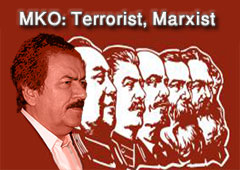In the early March, 2010, Ali Safavi (MKO spokesman) wrote an article on Huffington Post in an effort to purify his terrorist Marxist designated organization’s background. He claimed that the purpose of his forum is “to dispense with some of the myths originally propagated by Tehran’s intelligence service against MEK”. 
This is the first time MEK authorities are trying to “respond to various questions regarding the organization and its actions”. Ali Safavi initially deals with the Marxist label on MEK. He claims that MEK was founded as a “Muslim organization … and its founders sought a secular republic and establishment of a democracy in Iran.”(!)
A quick search on MEK ideology, history and the official reports by international bodies, gives you the connotation that the group has not been founded on secular basis and its founders had not been inspired by a secular doctrine.
Ali Akbar Rastgou, former member of MEK, in his book “Mujahedin Khalq in the mirror of history “, writes:”the ideology of the organization can be evaluated as a blend of Marxist and Islam”. He notes that the group’s leaders had focused on rhetorical work on the methodology of their organization particularly before 1970’s. He lists a number of books which were usually studied by Hanif Nejad ( A main founder of the group) in order to establish a firm, complete ideology for MEK. The books include: Mao’s Little Red Book, “Against Liberalism” of Mao, “Four philosophical Articles of Stalin”, “What is to be done?” of Lenin, ”On contradiction “ of Mao …. Then Saeed Mohsen (a founder of MKO) wrote a book titled “ An Introduction on Marxist studies” which was published in 1970’s.
The US State Department also describes MKO as an organization that was “formed in the 1960’s by the college-educated children of Iranian merchants, following a philosophy that mixes Marxism and Islam.”
“The escapees from this weird political sect, which combines Marxism ,elements of Islam and the Rajavi cult of Personality describe a harrowing experience, including torture, imprisonment and enforced brainwashing techniques.” writes Jusitn Raimondo in his article ”Assassins of Peace” published on Anti-war.com in 2008.
In contrast to what Ali Safavi propagandizes on the separation of religion and state, MEK principally believes in an ideological system rooted in the religion. That’s the huge contradiction in Safavi and his comrades’ claims. He claims to be a member of a Muslim organization; he quotes Masud Rajavi as saying that “believing in Muhammad is incompatible with the philosophy of Marxims.” and on the other side, he claims that MKO “founders sought a secular republic in Iran”
MEK might be able to deceive a part of public opinion by its fake slogans but in nature the only difference between its ideology and Marxism is the substitution of the term Marxism with new ones. The organizational system is based on individuality denial, censorship, violation of freedom, civil laws. A glance at the Marxism-based governments (socialists, communists like Mao and Stalin) shows up a lot of similarities between MKO’ s organizational system and those of Stalin or Mao.
Professor Paul Sheldon Foote of California State University calls Massoud Rajavi as Polpot of Iran. He thinks that the history of Polpot, the communist terrorist leader of Cambodia is very similar to that of MEK.
Another reason for labeling MEK as a Marxist group is its commitment to guerilla Warfare that caused them to commit numerous terrorist activities against civilians. Marx was an expert on military history and noted many cases of the use of armed struggle to achieve political power.
In the early 21th century, when Marxism is viewed as an old, abolished, rejected ideology, MEK ashamed of its scandalous background and along with its deceitful propaganda campaign, makes too much effort to purify its past. That’s why Massoud Rajavi and his accomplices like Ali Safavi view themselves forced to respond the numerous questions surrounding their ambiguous cult of personality.
By Mazda Parsi
